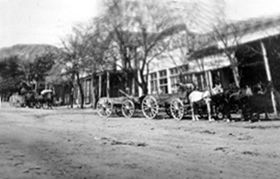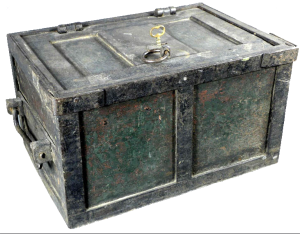By William Daugherty, for the Reno Evening Gazette in 1891
The stage, well loaded with passengers and heavily weighted down with express matter and mail bags, rolled out of Hamilton, Nevada at 3 o’clock in the afternoon of November 20, 1871, bound for Pioche. As this was a daily occurrence, it was nothing unusual in itself, for the mining excitement was at the highest. Raymond & Ely stock was selling at $125 per share, which a short time before was only $7. Many holders had suddenly become rich, and this stimulated the wildcat operations of the camp to such an extent that Pioche was filled with high salaried superintendents and secretaries, fighters and miners, and all indicated a thriving and becoming mining camp.

Early Pioche, Nevada
Money was plenty and high-priced jewelry ornamented the shirt fronts and vests of the mining officials. The stages that transported the bullion out of camp, also carried in coin and valuables by express and were consequently considered legitimate prizes by the road agents that often held them up.
On the day above named, the express box was observed to be heavier than usual, and although the agent and driver tried to conceal its weight when stowing it away in the front boot, passengers quietly remarked that the boys would make a good haul if they went for it. The stage rolled along through Eberhardt Canyon and on over the dusty road during the afternoon and reached the supper station without any interruption. It continued on during the evening and until after midnight, with the usual halts at stations for a change of horses and the usual exchange of small talk between driver and hostlers. One of the passengers was Jot Travis, who was one of the owners of the line, which, at that time, was earning money rapidly. Another passenger was a new agent for the express and stage departments at Pioche. About midnight a station was reached and the usual change of horses made, after which it rolled on its way, and soon the passengers were all asleep. Half an hour afterward they were awakened by the stopping and sudden starting up of the stage. Travis, more alert than the others, awoke first, and reaching to unbutton a curtain, said to the express agent, “What was that,” and got a sleepy reply “O! nothing; guess we just left a station.”
“No, said Travis, “we passed that two miles back. I heard something said about the box. I believe we’ve been robbed,” and he was making haste to throw open the curtain when the express agent held him back, saying: “Go slow. If we have been robbed you had better not poke your head out just now.”
“That’s so,” said Travis, “but I think we ought to stop and find out.”
He was again cautioned to wait a minute, for the stage was now bowling along as fast as six panting horses could haul it and it was very evident something unusual had occurred. Travis was impetuous and intrepid and called out to the driver, “Pat! what’s the matter?” and the reply came back in husky, muffled tones, “The boys took the box.”
“What’s that?” said Travis; “What did they say?” and the driver answered in the same subdued and hoarse whisper, “They took the box and told me to drive on, and said their guns carried 250 yards, and I’m not out of range yet;” and with a sharp flourish of silk, he urged on the panting horses.
Travis was furious. He insisted on getting out right there and pursuing the road agents at once; but when admonished that it would be hazardous with only revolvers and on foot to make an attack on the well-mounted robbers, armed with Winchesters, he subsided, but with some profanity over the fate that compelled him to. That night, the stage rolled into Pioche minus the treasure box and $1,700 in coin and jewelry. The Sheriff, John Kane, took the trail, stimulated by a big reward, but the robbers were never caught, although they were believed to have been in Pioche three days afterward gambling on their ill-gotten gains.
By William Daugherty article in the Reno Evening Gazette, September 8, 1891. Compiled and edited by Kathy Weiser/Legends of America, updated June 2021.
About the Author: Written by William Daugherty, for the Reno Evening Gazette in 1891. The Reno Evening Gazette was first published on October 12, 1876, and continued for the next 107 years. In 1977, it was merged with the Nevada State Journal, and continues to exist today as the Reno Gazette-Journal.
Also See:
Pioneers on the Nevada Frontier (Reno Evening Gazette)
Nevada Mining Tales (Reno Evening Gazette)
Pioche Land Jumpers and the Death of Jack Harris (Reno Evening Gazette)
Violence on the Nevada Frontier (Reno Evening Gazette)


